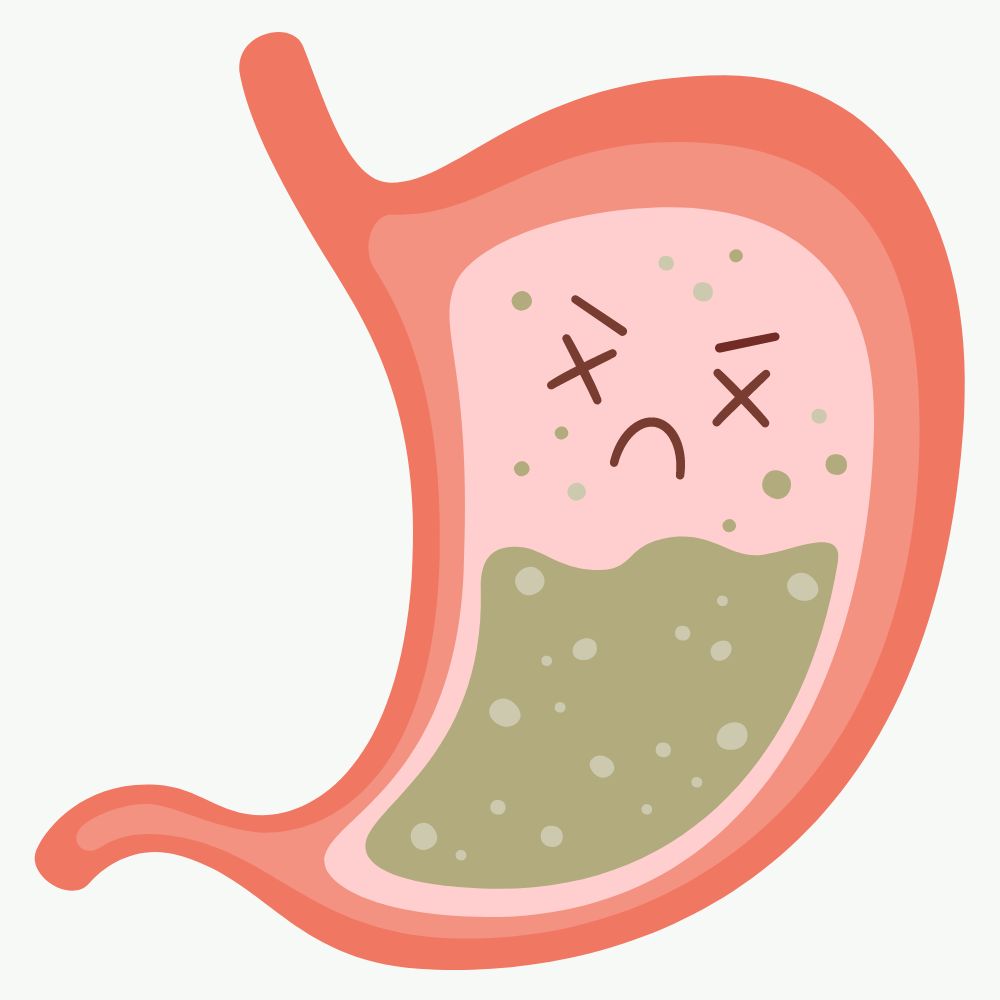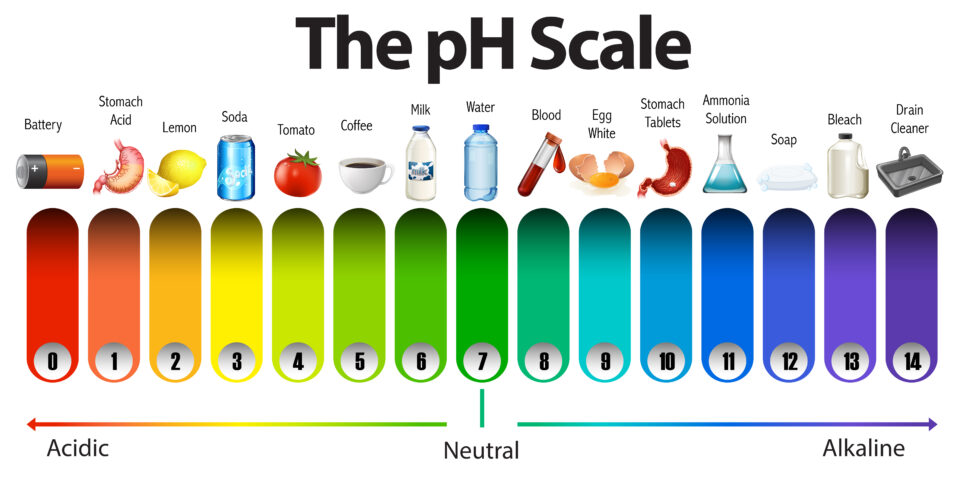Do you remember learning about the pH scale in school? If you do, this may bring you to an “Aha!” moment in a few short minutes. You may be thinking, “What does pH have to do with alkaline water?” or “ What is alkaline water anyway?” Let’s dive right in.
The first thing we need to know to understand alkaline water is about the pH scale ranges and what that means. From science class, we know water is made up of H2O, which is 2 parts hydrogen (or 2 hydrogen atoms) and 1 part oxygen (1 oxygen atom). “pH” is an abbreviation for potential hydrogen (remember, all of the elements start with a capital letter). The concentration amount of hydrogen ions ranges from 0 to 14 on the pH scale, with 0 being the most acidic, 7 is perfectly neutral, and 14 being the most alkaline.
Ah, but what does alkaline mean?
From looking at the pH scale image above, we can see that alkaline is the opposite of acidic. Alkaline is soluble and can help remove impurities. When you think about products that are alkaline, here are some examples: bleach, soap, drain cleaners, and more (anything with a pH higher than 7). When you think of acidic things, some examples may be batteries, lemons, vinegar, and even stomach acid. Keep in mind, having too much of something one way or another (at least in this instance) will always cause an imbalance. The perfect drinking water is neither acidic nor alkaline, as neither is technically considered safe to drink. Therefore, drinking water should ideally have a pH level of 7, which is a neutral pH. Normal drinking water generally contains alkaline byproducts, such as chlorine, that are used to clean the water at the treatment plant before it gets back to your home if you’re on city water. That’s not all, though. Stick with me and you’ll see what I mean.If that’s the case, why would those who live in Dallas Fort Worth Metropolitan Area even want to have alkaline water? What’s the purpose of alkaline water anyway?
Good questions! A lot of people who understand the health benefits of having better drinking water in their homes choose to get a reverse osmosis system, which can remove up to 99% of all of the contaminants and minerals in the water, giving you pure water, stripped of everything. Stripping everything out so you have completely pure water is awesome, right? The answer is yes and no. Sometimes reverse osmosis water can make the water have too much acid, but not all the time. And sometimes the water in your home may already be too acidic or have too much alkaline to begin with.No need for a PhD here, just a balanced pH
That’s why it’s important to test the pH of your water, even after having a reverse osmosis system installed in your home. You want to drink water that has a pH of 7. If it is less than that, an alkaline water system can add healthy minerals back into the water to improve your water quality to better than bottled water. Sometimes a reverse osmosis system does the trick and the pH is a perfect 7. That’s why an alkaline filter isn’t always recommended with reverse osmosis. However, sometimes a reverse osmosis system can take alkaline water or neutral water and make it slightly acidic, lowering the pH of the water closer to a 6. You can always get your water tested for free from a local water treatment dealer, like VA Water LLC to find out exactly what’s in your water and have them test the pH level at the same time.Is “alkaline water” truly alkaline water?
Here’s something interesting to think about. If an alkaline water filter can get the pH of water to be the perfect level – a pH of 7 – then that means the water is neutral. So is it really alkaline water? Technically you wouldn’t be drinking alkaline water if your water is at the basic pH of 7. True alkaline water typically is not what you want, but if your water goes through an alkaline water filter, people would normally say you are consuming alkaline water. Therefore, it’s just a difference in terminology that has changed the meaning of the words “alkaline water” for people.What about low pH water?
So what happens if your water is a little acidic, around a 6 on the pH scale, or you have alkaline water that is just slightly more alkaline than neutral, at a pH level of around 8? Don’t panic – this range is a safe range. You’re not likely to get gastroesophageal reflux disease or acid reflux at that point. If you’re used to drinking carbonated beverages regularly or even coffee, you shouldn’t give yourself high blood pressure, from stressing over the possibility that the pH of your water may be a little acidic. Lemon juice has a pH of 2, while a tomato’s pH level sits at 4. Coffee usually has a pH between 4 to 5 and milk has a pH level of 6.
While things like lemon juice, tomatoes, etc. can bother some people and cause them to experience gastrointestinal symptoms, that’s not always the case. However, if you are someone who struggles with acidic substances, it’s probably smart to make sure you’re staying hydrated with “alkaline water” which is getting your water’s pH levels closer to neutral. If you drink a lot of soda and coffee without issues, it’s not going to be the end of the world for you if you don’t have the best alkaline water, because your water is a little more acidic.
What happens if I already drank alkaline water with too much alkaline?
Let’s look at the flip side. Conversely, if you take tablets that help you with things like acid reflux, they generally have a high pH of 10 to help get your stomach acid levels back to normal. An alkaline intake with high pH levels may or may not pose any health risks, but it certainly doesn’t provide any health benefits either. Do you ever have dry and/or itchy skin? If so, the water you’re using may have a high pH due to hard mineral buildup from water contamination, which can happen in different ways.
Various chemicals or pollutants, and too much of certain minerals or metals can travel through the pipes in areas where there are damaged or rusty pipes. Even well water is no exception from getting too much of certain metals like iron, for instance, that are notorious for leaving orange streaks in sinks, showers, and toilets. Can you imagine what that’s doing to your insides if you’re drinking water that does that to your water-using appliances and other things your water touches? Are you starting to see the health benefits of having better water?
Get it tested.
That’s one of many reasons people get their water tested and end up with water softeners and whole-home water filtration systems. Not only do these types of systems help people with dry, itchy skin, but they also help prolong the life of water-using appliances, making laundry brighter, whiter, and clothes and towels softer. As a side note, a lot of people tend to complain that their water tastes bitter at or above a pH level of 8.5.
Is drinking alkaline water good, then?
If you think of alkaline water as water that has been purified by reverse osmosis and the good minerals put back (or still there) in to get your water back to that perfect pH of 7, then yes, drinking alkaline water is the way to go (or, as the Kool-Aid man once said, “Oh yeah!”)!

